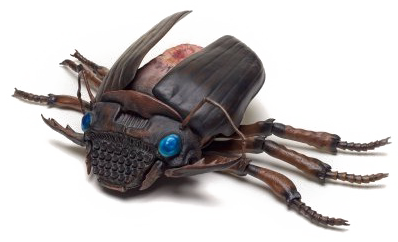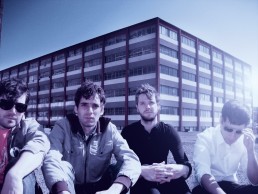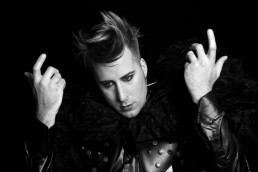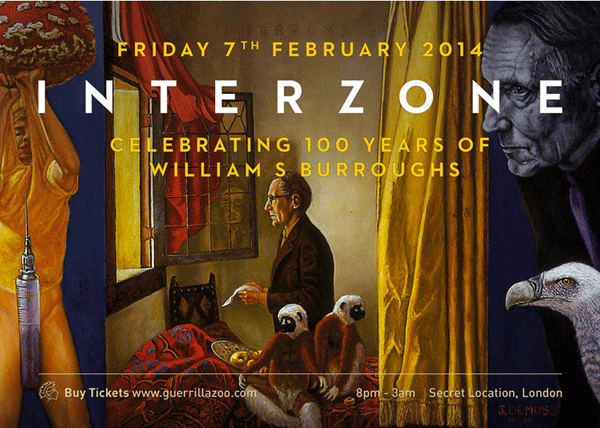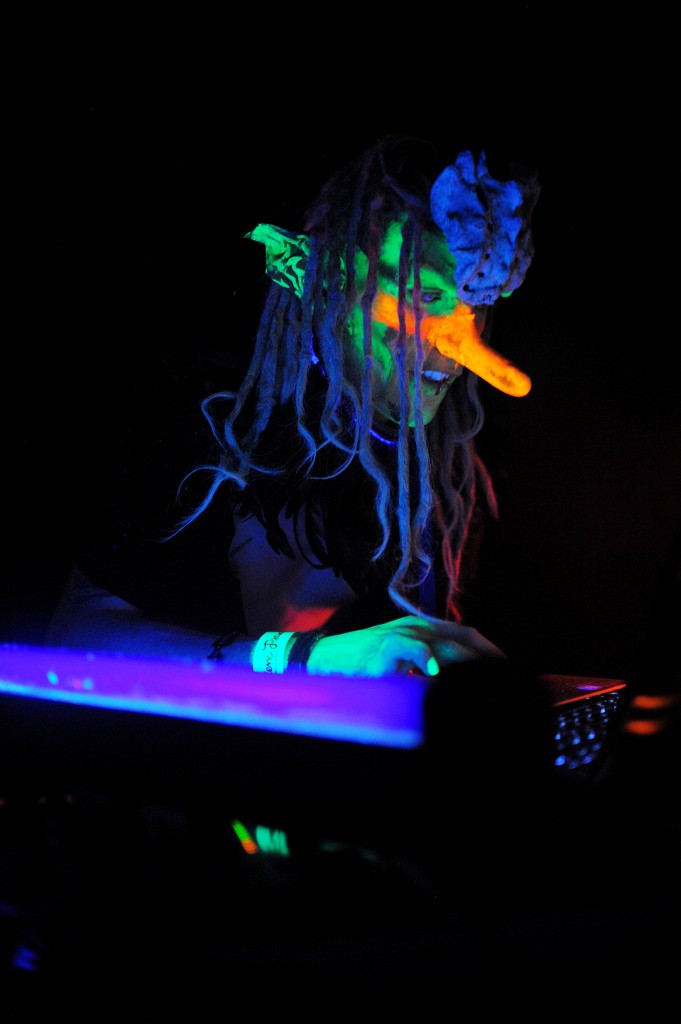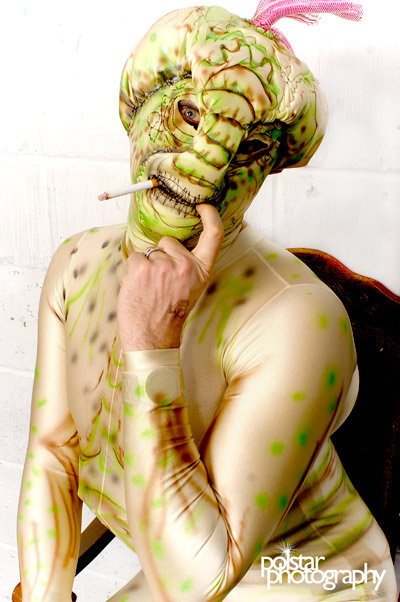Suuns are back and “It feels like a crazy slap in the face”
This was published on Village Underground's VUzine, which I edit. Although Ava Hapgood pulled together the final article, I'm very pleased with the format. The article is possibly the most Blowbackian format since Blowback.
Let’s set the scene: It’s four in the afternoon in London, eleven in the morning in Montreal. Dan is sat in a recycled Jubilee line tube train on top of Village Underground in Shoreditch, amid the sounds of computer keys and answering messages for the venue’s office. Around 3,243 miles away, Joe, guitarist, bassist and founding member of Suuns, can be found in his home just a few blocks from Montreal’s Breakglass Studios, where their second album, Images Du Futur, came into being.
Throughout the interview, life is condensed and pushed across the Atlantic - traffic grinds by as car horns congregate, children goad for attention and the phone buttons are accidentally pressed, the signal drops, echoes and distorts. These bursts disrupt the conversation like Suuns music: the drone and hum of technology of modern living with surprising sounds taking them in new directions. Breaking forms, reshuffling order.
Almost two years since their first show at VU, Suuns will return to Shoreditch this September with a new album for a new stage- an eigen pun that serves to highlight just how much has evolved for a band previously named after nothing.
D: Hi Joe- we thought we’d grab a little interview with you ahead of your performance at VU. Last time you played here was two years ago and you were on our smaller stage setup underneath the arches. This time you’ll be in the main space, a move which you must see happening a lot for the second album run of tours and gigging. Do you think playing to larger audiences affects the atmosphere on stage?

J: Yes I do remember that gig- and I think in general we are just a different band, so I think it will be a different show than it was almost two years ago. I think that will affect it more than the space but who knows I mean, it kinda seemed more like a warehouse vibe back then…
D: Yep it’s still very much got that vibe! Is there a danger as you become more popular that you lose that intimacy and response from a small audience? Do you think there’s a risk that something gets lost when you scale up?
J: I think that someone can always find a reason to claim it’s not as intimate- which is totally understandable- but I guess naturally it would happen if you were playing a bigger venue and by definition be less intimate. But we take that into consideration- all that’s changed really is the venue itself and that we’re a better band, so hopefully we can create an intimate space.
In what sounds like the outer edges of the conversation, rain begins to pound onto the roof of VU’s offices, reverberating off onto the EC2 pavement below and taking over the long-distance phone call at hand. Joe’s voice is almost totally obscured by the now very noisy, classic end-of British summertime fanfare.
D: Sorry about the rain interference by the way, we’re up on the roof, so when it rains we really hear it.
J: That’s awesome!
D: So I guess- [Shouting over the angry rain] - I guess a lot of people when they talk about your music focus on it sounding violent or aggressive- do you identify with that at all? Or is it more of a kind of raw energy?
J: I can see why people think that, but it’s definitely not where these things are coming from. It just happens that a lot of the time our songs end up that way, and it’s good, it makes the show a lot more intriguing and we don’t really have too many pop elements that are ‘happy’. I don’t really know how it happened - I know bands that use the same sort of set ups as us and it’s not at all the same so - a lot of it has to do with the vocals I’m sure- especially live- when we use a lot of harsh elements.
[Rain continues]
D: Yeah I think there is a visceral element- it’s that approach that hits home- it’s about the energy really rather than being outwardly aggressive or setting out to make ‘angry music’ as such.
J: It’s not like we’re trying to do any hardcore music- we’re definitely just trying to take it to a different place.
[The rain fades into the distance, Dan is able to hear himself speak again.]
D: Going back to your first album- what did you feel you’ve learnt from that and how did it affect your approach to Images Du Futur?
J: The first one was a very different record, we were completely independent, and we definitely made that record on our own time, a hundred per cent. The downside to that was we didn’t have much money or that much time to do it. We had been playing those songs for the better part of two years, and it’s kind of like we rushed in, played most of them live and then did a few overdubs. Luckily we had a few days to mix them, and that was it. We chose ten songs we thought would make a great album and then we got signed basically immediately and then started touring.
Images was really songs that were written in a short period of time in early 2012, and sound and cohesion-wise, the songs are a lot better, in respect that it sounds more like an album that came from a certain period. But that had its challenges as well- a lot of songs were not tested live, so we were just sort of working on them in the studio and we had no idea if they would really do well live before we started recording them. I hope it’s not a case where each record will be the magnetic opposite of the previous ones- but I don't think so.
[In the background now in Montreal, a child demands attention]
A child: DDDADDYYYY!
J: I think there’s a lot -
C: DADDY!
J: There’s a lot we’ve taken from -
C: DADD-
J: Sorry, hold on, my son’s here. Just go with Mommy for two minutes- [child is led/ carried away] he gets jealous that I’m in another room. Anyway. Back to that- there’s so much we’ve taken from both experiences that we can remember and apply for the next one- which is basically happening very soon.

D: You’ve named your album after the Images Du Futur exhibitions in Montreal, and you’ve all lived there for at least ten years- do you think the album in a way celebrates that legacy of Montreal?
J: There’s a definite lifestyle to this city and it’s especially good to musicians. It’s cheap to live here, everything is very close and compact- I walk five minutes to my studio and so does every other member of our band. Everything we kind of do is in some way an homage to this place just because it’s been such an influence on us- this band would not have started. It means we’ve been able to put a lot of work into the band because we don’t need to put a lot of work into surviving. It frees us up to be really devoted to do what we want to do, which is priceless, really.
D: Looking “to the future” now- do you view it as being essentially dystopic, is that the kind of future we’re going towards, or are we headed to a cleaner, brighter, better future?
J: Every time I think of the future it’s like a fake future to me. I always think of when I was six years old and I thought about the future and there’s those 80s movies where it’s always dark and smoke everywhere- but living in the age we live in, I don’t think [the future] is necessarily good but I don’t think it will be dystopic. If anything it will hopefully be positive. I gotta believe that.
D: In a way that’s why the Image Du Futur [formally an annual festival in Montreal] was so interesting, because it was about celebrating the possibilities of the future rather than thinking we’re all doomed.
J: Definitely. And it was a take on how we used to view the future- it’s like this retro view of the future, which is awesome. It’s great to see predictions come true, and what didn’t come true. So it’s kind of about realising that you make that happen, slowly. It sounds so cheesy and the name of the record can be so cheesy, but that’s exactly it. It can be exactly what you make of it.
Suuns are back at Village Undeground on 29th September supported by Grumbling Fur - last few remaining tickets here.
Continuing to approach Nude in new ways
My article originally published on Run Riot
Jamie McDermott is late for his interview because he's just confirmed a wedding booking. Whereas with other bands this largely involves covering The Commitments to a room that's too busy getting drunk to give a toss, for Jamie it might just be the highlight of his career. At the end of the month The Irrepressibles will play the first gay wedding in the UK.
"I think it's going be one of most beautiful evenings of my life, it will be incredible," says Jamie,"We're going to be playing Two Men In Love, as they get married."
For two albums and three recent EPs his band have flitted between musical styles like a cultured yet populist iPod on permanent shuffle but one thing has remained constant: enduring love and the belief that everyone has a right to it. It feels odd that in the 21st century that this is still an issue. I ask Jamie whether he thinks we have gone backwards rather than forwards in recent years, particularly when we look at arcane laws that Russia and other countries enforce.
"We were over in Russia recently and were able to see the situation first hand. In many ways they are far freer than under the communist regime. Really now the problem is that it's ruled by a religious dictator who got into his position via his relationship with the Russian orthodox church. In terms of ex-colonial countries, there's very much a legacy from the British missionaries, it's still very active and that's not going to be affected by Western politics. And of course, there is much more of a systematic hard line in the way they deliver the penalty."
The Irrepressibles performed a free concert in Gorky Park, Moscow last year. As a band with openly gay members who unashamedly confront this with their music, this was an extremely brave decision and not one that Jamie took lightly.
"It was terrifying, I cried on the train on the way there, more for the band than myself because they were so steady and determined to do it. And a lot of them are straight, including the two drummers at the back of the band but they were so behind it. So much so actually, that when the Russian technical staff refused to play our video, one of the drummers threw his sticks at them!"
This wasn't a video that reached Frankie Goes To Hollywood levels of Bacchanalian excess, it featured gay male couples kissing. Controversial in Russia perhaps, but it is also an idea so "abhorrent" that it frequently gets their beautiful, honest and affectionate videos banned on social networks. Jamie's response isn't to tone this down, it's to coerce more couples into kissing, and filming that. The aforementioned video for Two Men In Love features a crescendo of canoodling couples and last week the video of their forthcoming release The Edge of Now saw their fans recreating the "restricted" Arrow video of two men wrestling with their emotions, and each other. I ask Jamie about his relationship with his audience.
"In some respects I'm not really a traditional pop star in the way that I don't really have much of a guard. I've performed in different garbs and have taken to different ways of performing. It's quite funny actually, I met some guys at one point and they thought I'd be really haughty and arrogant and I guess that's sometimes the way we appear on stage but we don't have that attitude really. The important thing for me is trying to say something about a time that is honest. It's about telling a story about something that's real when it communicates properly that's a wonderful thing. It's always really scary when I bring out new work because I worry that others might not like it. Making videos about a group of people saying something is a really wonderful thing."
Nude is the name of The Irrepressibles last album and the recent three EPs were also Nude variants. Nude:Viscera the most recent EP saw the band (pun intended) stripped down to the bare essentials of guitar and light orchestration. It's hugely impactful - nothing is dressed up or obscured, just a raw soaring vocal coming straight from the heart, as nature intended.
"Nude originally was an album that I made before I was signed," says Jamie "the idea was to perform the songs on a guitar in one go. Then when we looked at mixing the album with The Irrepressibles I wanted to make something that was broader… that also represented the time that the songs were written in. When I finished the record there were songs that didn't fit the main record. They weren't any less songs but they were too raw and mine. These songs needed to be released in some way so the idea was to do a second part, but they didn't fit on one record. So the idea was to inhabit three different worlds with three different EPs."
The Irrepressibles performance at Village Underground will be stripped down, Jamie explains the set up in more detail.
"The set-up is a five piece rock band, with a grunge exotica feel. We've got piano, viola, cello and guitar - it's a really wonderful sound. It's quite exciting for me because we usually have something that's very set or electronic, it's good to have movement. The musicians are wonderful. There's no chance of a big spectacle with this, it's about the energy of playing punchy loud rock music."
We wonder if Jamie will be stage-diving?
"I don't think so," he says with a little laugh.
theirrepressibles.com
The Irrepressibles play Nude:Viscera at Village Underground on 26th March, tickets here
Trip to Interzone: a Burroughsian interview with Guerilla Zoo's James Elphick
Originally published on Run Riot
On Friday (7 Feb 2014) an undisclosed part of London will slide into the realms of Interzone. You’re invited to join the “misfits, terrorists, traffickers of delusion, tribes, deviants, delinquents, corrupt officials, Beatniks, Mugwumps, government agents, re-occurring dream characters, lady boys, drag kings, cannibals, merchants of sex, time travellers, practitioners of the Dark Arts, people who aren’t allowed on planes, gypsies, Egyptian Gods, Arabian royalty, Sufi dervishes and Moroccan hawkers” for a night inside the lucid and fully realised mind of William S Burroughs. This promenade performance and party of excess will mark what would be the writer’s 100th birthday.
Burroughs merged with the infinite in 1997 but his literary legacy and cultural prominence still stands firm and proud. As one of key inquisitors of the Beat movement, Old Bull Lee (a pseudonym that he and his peers used) presided over the Beatniks with a bloodshot but steel-eyed stare. He was both brutally honest about his “junk” dependency yet took fantastical cut up creative kicks. Interzone was the netherworld which he conjured and inhabited - partly 1950s Tangier in Morocco and partly the world that he slipped into when he was dreaming or hallucinating.
Guerilla Zoo have incited Interzone before, the immersive performance with music, film and art thrown together to create an exploded Burroughs bubble, that has the blessing of his estate. After listening to Burroughs’ distinctive hardboiled drawl in spoken word readings all morning, I interviewed James Elphick. Apologies if some of Bull Lee has worked its way into the interrogation, it’s a habit that’s near impossible to kick…
Dan Davies: People tend to come to Burroughs through the back channels how did you become acquainted with him?
James Elphick: My first taste of Burroughs was reading Naked Lunch. I'd never read anything quite like it before; a nightmarish world of lucid precision taking the lurid and profane with a sprinkling of dark comedy. A bustling, whirling, unwinding, universe of previously un-uttered perversions and stark naked realities hit me off centre, knocked my thoughts off their feet and into uncharted territories. I explored his Naropa Lectures and the many mind machines he mentioned (such as the Dreamachine) and found a man who somehow through all of the events his life brought, really knew what was going on.
Dan Davies: What first appealed to you about the way he flipped the script?
James Elphick: Burroughs saw the world with a highly educated un-nerving lucidity. His experiences across his long life had many highs and lows, despite this he remained on top of his game and even into his last years was highly productive and creative. His books, his collaborations (especially with Brion Gysin), his artworks, his methods, really broke down the walls of freedom and expression and manifested new ways of creating.
Dan Davies: Why do you think he was such a supreme hit for people yet remained a permanent fix through time and space?
James Elphick: Burroughs' writings are a right of passage for many younger readers. He's talent for routing out the relevant and making it stand strong with the parallels of today, which make his work extremely relevant now. He touched on subjects way back that have only now been making headlines such as Julian Assange's Wikileaks and Edward Snowden's NSA revelations.
He was very well read, looked deep into historical, religious, political references, current press media and trends, and his own minds eye. He was informed by a lifetime of dialogue with provocative and penetrating thinkers. Often these interactions sparked new directions in writing, film, sound, and visual art. Notable collaborators include Antony Balch, Ian Sommerville, Jack Kerouac, Allen Ginsberg, Keith Haring, Robert Wilson, Tom Waits, Kurt Cobain, John Giorno and Terry Southern. His works have inspired countless people especially musicians including, David Bowie, The Beatles, Thurston Moore and The Klaxons, to name but a few.
Dan Davies: You've ventured to Interzone before, what's happening? What gives?
James Elphick: Here's a quote - "Hipsters with smooth copper-colored faces lounge in doorways twisting shrunk heads on gold chains, their faces blank with an insect's unseeing calm. Behind them, through open doors, tables and booths and bars, and kitchens and baths, copulating couples on rows of brass beds, crisscross of a thousand hammocks, junkies tying up for a shot, opium smokers, hashish smokers, people eating talking bathing back into a haze of smoke and steam. The City is visited by epidemics of violence, and the untended dead are eaten by vultures in the streets... A place where the unknown past and the emergent future meet in a vibrating soundless hum. Larval entities waiting for a Live One ." - Edited extract from Naked Lunch.
Burroughs' stateless city of Interzone is a vast visual realm of inspiration. It was a perfect opportunity to bring something very special together. In 2008 Guerrilla Zoo did our previousInterzone event, which was picked up by the papers and was a great success. I'm not kidding, it has been cited by many as "best night out in London ever. Ever!" So with this being Burroughs' centenary year I thought for one night only, to open the doors to the city once more. This is an experiential event on many levels but also a party to celebrate Burroughs 100th birthday. Buy your ticket to travel. Pack your Passport. Step into a microcosm of all the world by moonlight.
Dan Davies: How do you get your audience to loosen up and lose themselves and their minds?
James Elphick: They have free reign to move through the space, they can engage and discover moments to get lost in or they can be passive observers, it depends how far down the rabbit hole they are willing to go.
Dan Davies: Will Old Bull Lee be your guide through Interzone or is it every man woman and child for themselves in there?
James Elphick: There will be some recognisable characters from his books to engage with, but Interzone is for you to explore, there are no guides here, it is all about your own self discovery.
Dan Davies: How do you induce the atmosphere of Interzone?
James Elphick: One example would be working with Gorilla Perfume, who are providing special scents, which is a powerful play on the audience's subconscious to pick up on. One in particular is a sort of paranoid inducing smell called 'The Bug' for some of the more tense scenarios.
Dan Davies: Burroughs work can often be filmic in written delivery and dialogue yet impossible to fully realise off the page how do you approach this contradiction?
James Elphick: I'm not adapting word for word like a play, Interzone is an interpretation, inspired by the many universes of Burroughs writings. Much like how David Cronenberg's adaptation ofNaked Lunch was part novel, part biographical, part Cronenbergian dreamworld!
Dan Davies: What do you think interested the executors of his estate in your general demeanour?
James Elphick: I want to introduce Burroughs works to a new generation and bring his legacy to new eyes. Interzone is just one way of connecting people to hear about him and to encourage them to pick up one of his brilliant books. I also co run www.burroughs100.com, which is the official Burroughs website, full of articles, exclusive features, rare material and listings for many events happening around the world.
Dan Davies: Can you give us an insight into the musical accompaniment for the evening?
James Elphick: We have an eclectic varied line up of genres from Sufi trance inducing sounds, jazz music of the era, to cut-up inspired performances, busking musicians, to underground dance music to get the party going.
Dan Davies: Do you have any words of advice for young people?
James Elphick: I think Burroughs put's it best in this Youtube clip:
Interzone
Secret Location
07 Feb 2014
20:00 - 03:00
Buy your ticket to travel here
